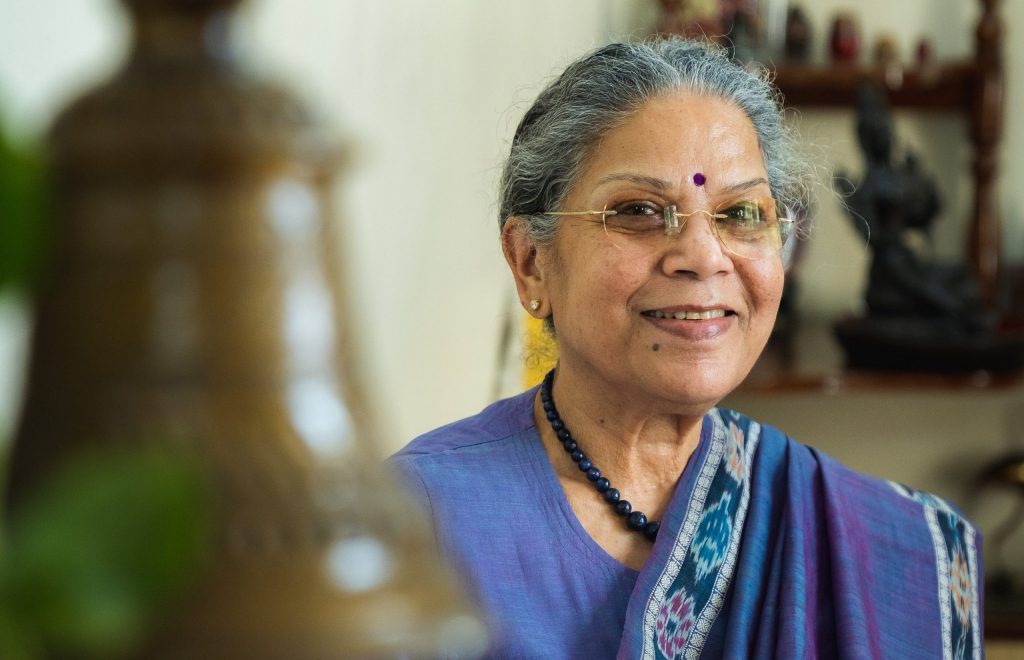 Dr. Sushila Narsimhan
Dr. Sushila NarsimhanJF Fellowship has contributed to enhancing my self-confidence, academic career, position and status in the world of Japanese Studies.
Professor of Japanese Studies who taught History of Japan to graduates and undergraduates at the University of Delhi from 1964 to 2007.
Prof. Sushila has specialization is Japan’s Meiji period. Her major publications include, one authored book, Nineteenth Century Japanese Perceptions of China: Influence of Fukuzawa Yukichi (New Delhi: 1999); and a number of research papers. She has edited/co-edited more than 15 books on India and East Asia, India and South Korea, and India and Japan. Her latest edited book is, India-Japan Narratives: Lesser known historical and cultural interactions (New Delhi: 2021).
She received The Japan Foundation Fellowships twice, once in 1987-88 and other in 2001, and was affiliated with the University of Tokyo, for her doctoral and post-doctoral research, respectively. She also got UGC Field Trip Grant for post-doctoral research at Stanford University, California, in 2002.
Her doctoral research theme was: “Changing Japanese perceptions of 19th-century China: With emphasis on Fukuzawa Yukichi.” The Fellowship enabled her to go to Japan to collect research materials (both primary and secondary), interact with scholars and carry out in-depth research. During her long stay, she could derive first-hand insights about the country and its people, which gave her the necessary exposure broadening her perspectives and understanding of Japan. All this contributed to enhancing her self-confidence, academic career, position and status in the world of Japanese Studies.
On being asked to share her memorable events from the Fellowship days, she shares about an unforgettable exciting event, which she still cherishes. It was her participation in Obon festival (at Setagaya-ku in Tokyo). Obon is a very lively event when the Japanese honour and welcome the deceased by singing and dancing. “While most were in Japanese traditional dress, I was the only Indian and in saree. As I approached the venue, there were some who greeted with folded hands gesturing ‘Namaste’. I could hear them whispering ‘ああ、仏様の国からね!’(Oh, she is from the Land of Buddha!’). A saree has such strong cultural narrative. Obon episode turned out to be a memorable experience. I don’t know how the news spread, but a few days later, I got an invitation from Meguro-ku Bijutsu kan (Tokyo) who wanted to interview me and also talk and demonstrate about saree. This is the power of this elegant Indian dress!”
Based on her rich experience in research and teaching of Japanese history, she feels that compared to Japanese Language-learning, Japanese Studies (a part of Area Studies) in India is still in a very miniscule stage. According to her, much of the research on Japan that has so far been generated in India suffers from “repetitiveness and lack of originality”. The current state of Japanese studies in India is very Western-oriented. Instead of relying totally upon the Western scholarship and perspectives, she believes that one should also study what the Japanese are writing about themselves. Japan must be studied in totality through multi-disciplinary tools. While the language-learners must also study Japan, similarly, those studying Japanese history, politics, economy, society, international affairs, etc. must learn the language to be able to read Japanese language-source materials. Only then one can offer something fresh and innovative and make a meaningful contribution to the social science disciplines.
Prof. Narsimhan emphasis about how a large majority of young researchers are drawn towards Japan’s current politics, economy, and international affairs. And language experts prefer to work on literary writings, or sociological aspects. There are hardly any takers for Japan’s fascinating art and aesthetics. Interest in Japan’s history and culture is virtually missing.
In 2015, she had done an extensive survey of Japanese Studies in India and also compiled a Directory of Indian scholars of Japanese Studies, which was subsequently published by The Japan Foundation, New Delhi. She says that the directory needs to be updated from time to time, network must be widened to facilitate interactions with the Japanologists all over the world, and thereby promote Japanese Studies.
 Twitter
Twitter

 '
'